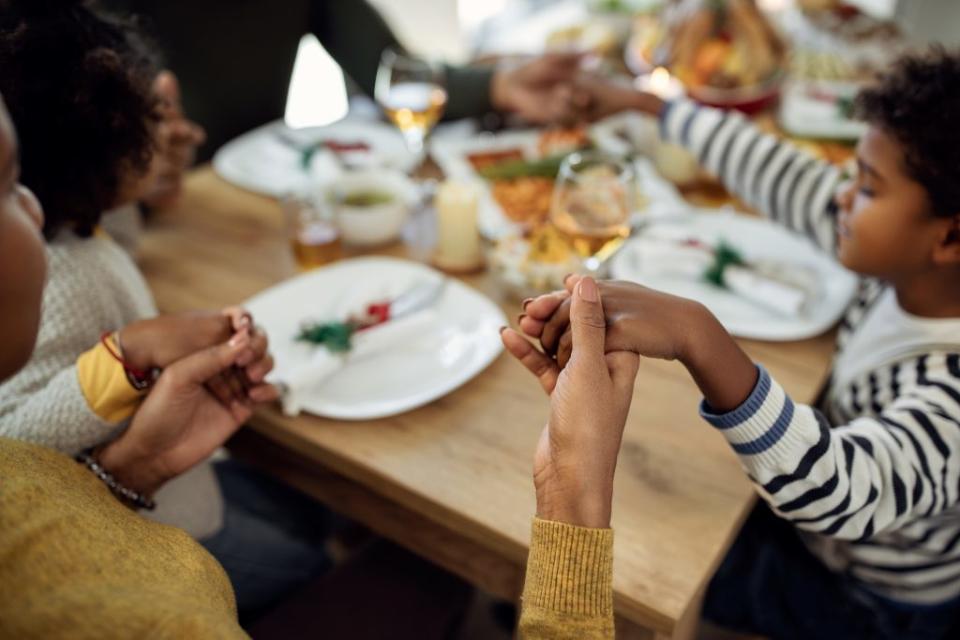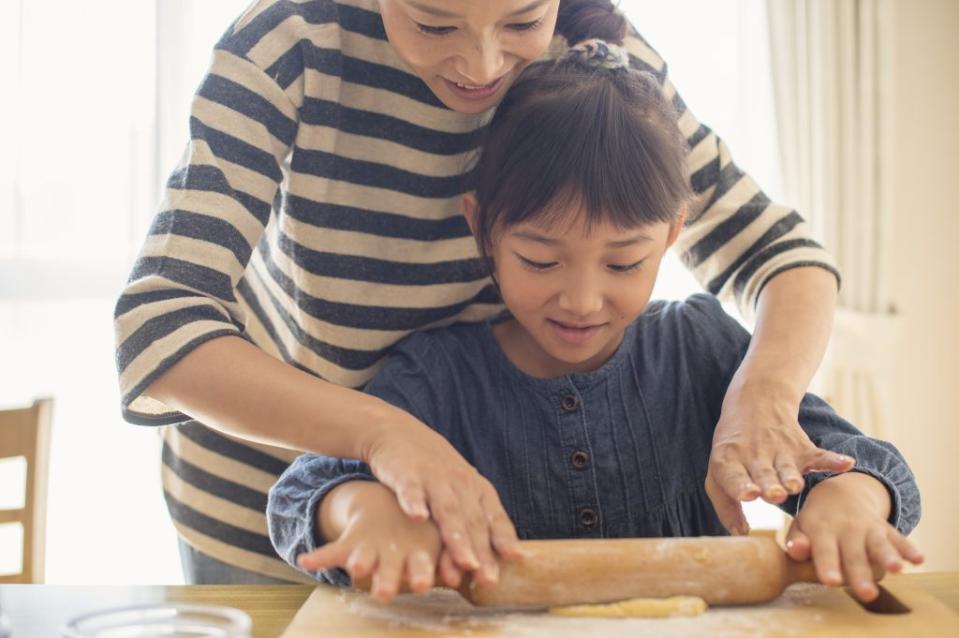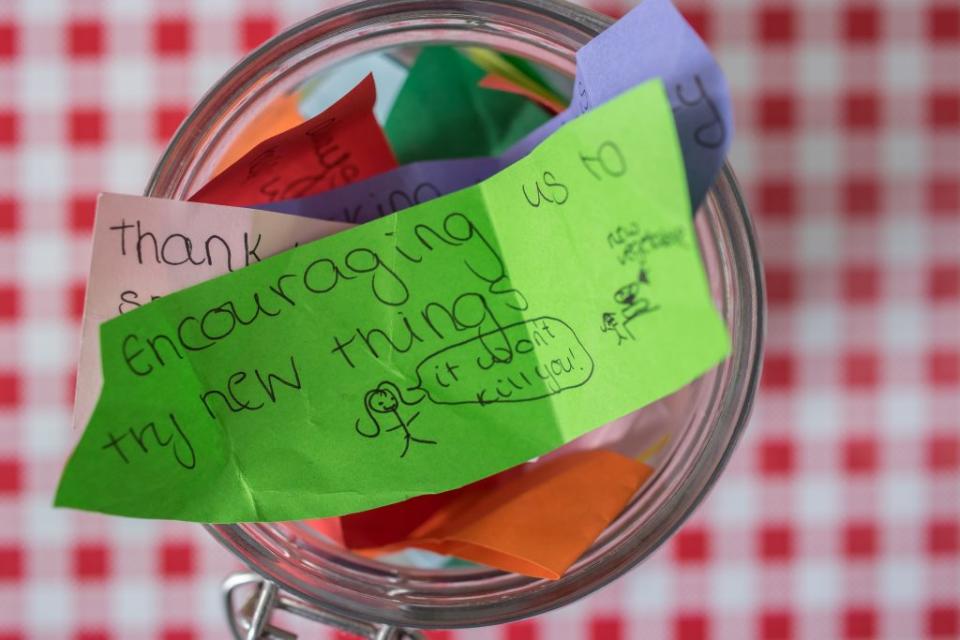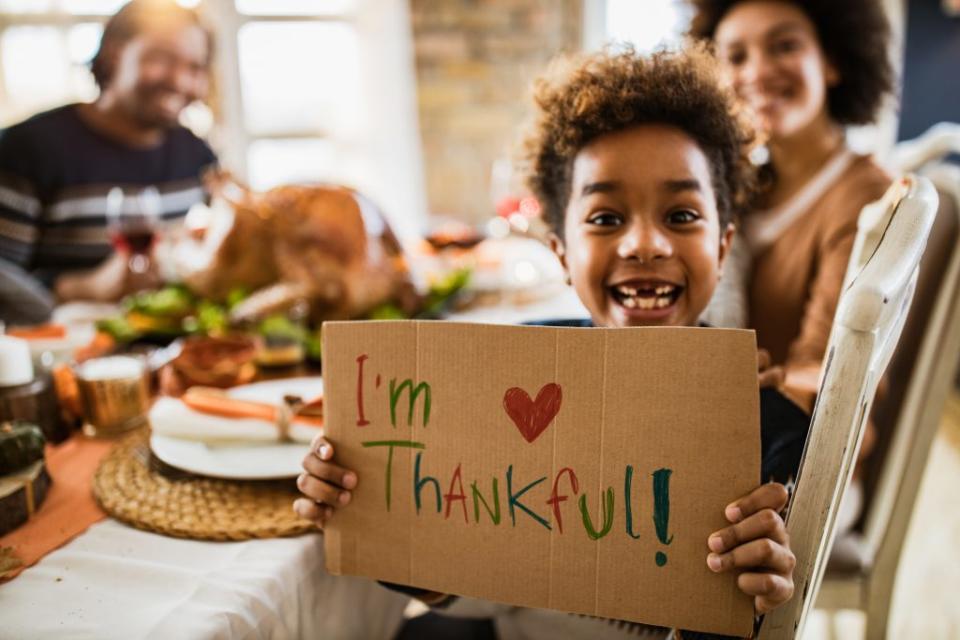How raising thankful kids could help them lead healthier, happier lives

Before giant turkeys, parades, football games and discount shopping, there was lowercase “t” thanksgiving.
The tradition of thanksgiving — that is, the act of giving thanks — has a history that stretches well beyond the fourth Thursday of every November. And its roots go back long before that mythical First Thanksgiving on Wampanoag land when America was establishing its colonies.
For thousands of years, civilizations around the world have practiced days of thanksgiving — not just once a year, but anytime a meaningful or wonderful event occurred. A rain after a long drought, surviving a bout of sickness, a plentiful harvest after much toiling and scarcity — these were all occasions celebrated with days of thanksgiving and praise.
Nowadays, the act of formally giving thanks has been compacted into just one day of the year. But what if we tried revisiting thanksgivings of yore by celebrating life’s everyday blessings?
Unfortunately, due to a condition called “negative bias,” our modern brains make it challenging to see and appreciate all of the positive things in our lives. We recall insults more accurately than praise, remember sad memories more vividly than happy ones and focus on flaws more than strengths.
But dwelling on the negative can hamper us greatly. Depression, anxiety, low self-worth and chronic worry are just some of the side effects of negative thinking.
So how can we rewire our brains to more readily observe and appreciate the positive? Like any muscle we wish to strengthen and grow, we have to exercise it. And the sooner we can start working out that gratitude muscle, the better.

Gratitude is linked to happiness in children by age 5
Considering all the stressors and struggles of “grown-up” life — work, bills, health issues, politics — we might assume that only adults can practice or benefit from thanksgiving.
But, in fact, studies have found that gratitude is linked to happiness in children just 5 years old — meaning the seed of thankfulness takes root very early in life.
“ Teaching your children how to be grateful from an early age can bring immediate and lifetime positive effects in their lives,” says Clara Lawson, MD.
In fact, more than forgiveness, patience or self-control, gratitude has proven to be a better predictor of hope and happiness in children.

Gratitude yields a lifetime of physical and mental benefits
“Seeing the glass half full” might be a stale, old cliche. But putting that phrase into practice can have a powerful impact on our health and well-being.
Individuals who practice gratitude have reported being active, getting good nutrition, maintaining a social support base and visiting the doctor regularly. They smoke less, sleep better, seek help when they need it and report fewer aches and pains.
These benefits all contribute to decreased depression and anxiety while increasing emotional resilience — factors that help us overcome trauma and stress.
Grateful people also tend to be more compassionate, friendly and empathetic. These characteristics can help people make friends more readily, leading to more success at work, in their personal lives and within their communities.
Thus, if every parent made it their mission to raise emotionally secure, resilient, thoughtful, motivated and friendly humans, we would no doubt live in a happier, healthier, more positive world.

Gratitude can be exercised in a number of fun, easy ways
Gratitude exercises don’t have to be HIIT to be effective! Small, everyday practices are all it takes to reap the benefits of thanksgiving. Plus, the whole family can enjoy getting involved.
Cherish the little moments
We experience small miracles every single day that can easily go unnoticed.
Our sense of smell, a cold glass of water, the ability to think and speak, the warm glow of a lamp, changing leaves, clean sheets — get in the habit of stopping to reflect on these tiny but impossibly wonderful things.
“ Teach your children to cherish the beautiful things and relationships in their lives,” says Dr. Lawson. “Start from the smallest things. Guide them to be thankful for having books to learn from or having toys to play with.”
When you notice something you’re thankful for, stop what you’re doing and say out loud to your family, “Isn’t this amazing?” or “Aren’t you glad we have this?” Start a conversation about what makes that thing so wonderful and what your life would be like without it.
Make a gratitude station
As a family, decorate a jar or box in a way that makes you happy. Beside it, place a basket of scraps of paper and a fun pen or pencil. Designate this area as your family’s special “gratitude station.”
Then, whenever someone feels thankful for something — a fun day at the park, a delicious dinner, a new toy — encourage them to write it down and slip it into the box or jar.
When the jar is full, or perhaps as a fun New Year’s Eve ritual, shake out all of the submissions and read them over as a family.
“[This] will encourage [your kids] to remember and appreciate the positive sides of their life and maintain a consistent grateful attitude that will go with them for the rest of their lives,” says Dr. Lawson.
Say grace at mealtime
We tend to think of saying grace as a religious practice. But expressing thanks for a warm and nutritious meal — a blessing denied to many hungry souls around the world — needn’t be tied to any particular spiritual belief.
After you sit down at the table as a family (a practice that also yields many lifelong benefits to children), take a moment to express gratitude in any way that feels comfortable to you.
“Mealtime is an excellent way to teach your kids to be grateful in life, [which] greatly contributes to cultivating a positive attitude for a lifetime,” says Dr. Lawson.
Reflect before bed
Rather than counting sheep at night, try counting your blessings!
As we fall asleep, our brains tend to needlessly rattle off lists of everything wrong or stressful in our lives. “The car needs an oil change. I should have thawed that chicken. Why did I say that in today’s meeting? The electricity bill is going to be high this month…”
Try as we might to shake off these worries with a parade of fluffy livestock, when our brains start racing with anxious thoughts, it activates our fight-or-flight system — which is sure to keep sleep at bay, no matter how many sheep we count.
Nip these anxious thoughts in the bud by turning bedtime into a period of thankful, thoughtful meditation. Keep a journal in your bedside table and physically write out all the things you’re thankful for, big and small — or simply list them in your head.
Get your children in the habit of also associating bedtime with gratitude. Sit with them and talk through their day. Have them tell you all the good things that happened to them or things that made them happy.
Encourage them to do this even if you’re not there to tuck them in. This will help them establish a lifelong practice.
Model gratitude
Science says that faking a smile when you’re in a bad mood can actually trick your body into releasing dopamine and serotonin, the hormones that make you feel happy. So try the same trick when it comes to expressing gratitude!
Even if everything in your life seems to be going wrong — health issue after health issue, mounting bills, pressure at work — make a point to say “thank you” for all the things going right.
Say “thank you” to the waitress who refills your drink, or say “I appreciate you” to your spouse when they finish washing the dishes.
Expressing appreciation often and out loud will not only help you to feel better, but it will also model healthy behavior for your ever-watchful little ones.
“Children are attuned to the energy you give off. If you’re constantly complaining about everything, they will pick up on that and follow suit,” says Mariyam Abid, an early childhood development expert.
And while you’re thanking all the adults in your life, be sure to say “thank you” to your kids as well. “Thank you for clearing the dishes.” “You fed the dog, thank you!” “I really appreciate how polite you were at dinner.”
Not only will this make them feel like a valued and respected member of the family, thus encouraging them to keep up that good behavior — but it will also inspire them to instill those good feelings in others.

Gratitude should be practiced 365 days a year
Celebrating a holiday dedicated to thanks and gratitude is a wonderful practice — and doing so with a great feast and fun traditions can help families make many treasured memories together.
But it’s important to normalize thanksgiving as something we practice year-round — not just for our own well-being, but for our children’s as well.
So this year, as you’re celebrating uppercase “T” Thanksgiving, be sure to keep lowercase “t” thanksgiving in your heart as well — even when the turkey is gone, and the big game is over. Your children will thank you.
In The Know is now available on Apple News — follow us here!
If you enjoyed this story, check out five ways to get your kids involved in giving back this Thanksgiving!
The post How raising thankful kids could help them lead healthier, happier lives appeared first on In The Know.
More from In The Know:
5 gratitude games to play with your family at the Thanksgiving table
How to explain Thanksgiving fact vs. fiction to your kids
Disney's new holiday PJs are here and they're selling out quickly — buy a pair before they're gone
Shopping for a Star Wars fan this holiday season? TikTok thinks they'll love this gift

 Yahoo Finance
Yahoo Finance 